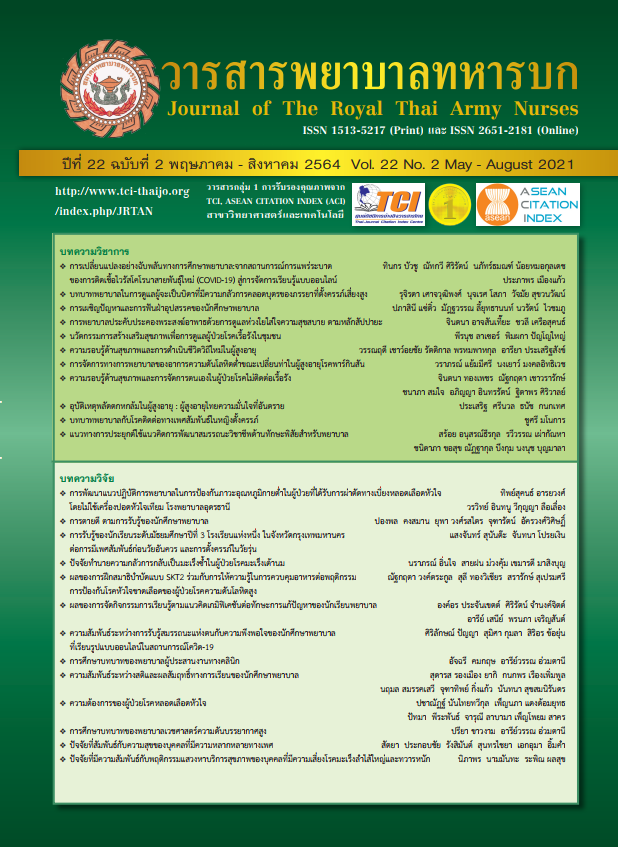Health Literacy and self-management in Non-communicable diseases (NCDs)
Keywords:
Health Literacy, self-management, Non-communicable disease (NCDs)Abstract
Patients with non-communicable diseases (NCDs) are essential and crucial in modifying health behaviors to be consistent and appropriate with their illnesses by motivating them to take care of and manage their health problems. Health literacy, which is a cognitive and social skill, helps a person to reach understand and use information in different ways. This leads to the development ability and self-management skills to maintain and continued good health. Nurses and health care personnel team as a conssequence play an important role in promoting and supporting NCDs patients to manage themselves by using Health Literacy to control their diseases as well as decrease the severity and complications of the illness, promote quality of life resulting in reduced healthcare costs. This academic article accordingly presents the concept of health literacy and the sequence of steps for developing health literacy in the context of Thailand as well as presenting concepts and self-management processes of individuals and families including bringing such concepts into practice so that it can be applied in the development of supporting intervention, promote self-management in combination with the development of health literacy in patients with NCDs. This is the key to success and further improving health outcomes in patients with NCDs.
Downloads
References
Bennett JE, Stevens GA, Mathers CD, Bonita R, Rehm J, Kruk ME, Riley LM, Dain K, Kengne AP, Chalkidou K, Beagley J. NCD Countdown 2030: Worldwide Trends In Non-Communicable Disease Mortality And Progress Towards Sustainable Development Goal Target 3.4. The Lancet. 2018; 392(10152):1072-88.
World Health Organization. World health statistics 2020: monitoring health for the SDGs, Sustainable Development Goals. Geneva; 2020
Aekplakorn W, Abbott-Klafter J, Khonputsa P, Tatsanavivat P, Chongsuvivatwong V, Chariyalertsak S, Sangwatanaroj S, Tiptaradol S, Lim SS. Prevalence and management of prehypertension and hypertension by geographic regions of Thailand: the Third National Health Examination Survey, 2004. Journal of hypertension. 2008; 26(2):191-8. (in Thai)
Nilsson PM, Cederholm J. Diabetes, hypertension, and outcome studies: overview 2010. Diabetes Care. 2011; 34 (Supplement 2):S109-13.
Pragodpol P, Suwannaka Y, Sosome B. Levels of Quality of Life and Method to Develop Quality of Life in Thai Chronically ill patients. 2015: Bangkok: Health System Research Institute. (in Thai)
Ryan P, Sawin KJ. The individual and family self-management theory: Background and perspectives on context, process, and outcomes. Nursing outlook. 2009;57(4):217-25.
Woratanarat T. (2018). Health literacy for NCDs: Systematic Review: Bangkok: Health System Research Institute. (in Thai)
Nutbeem D. The evolving concept of health literacy. Social Science and Medicine. 2008; 67:2072-8.
Tachavijitjaru C. Health Literacy: A key Indicator towards Good Health Behavior and Health Outcomes. Journal of the Royal Thai Army Nurses. 2018; 19(25):1-11. (in Thai)
World Health Organization. Dept. of Violence, Injury Prevention, World Health Organization. Violence, Injury Prevention, World Health Organization. Global status report on road safety: time for action. World Health Organization; 2009.
Estacio, E.V., & Coming, J. Health literacy: exploring future directions and potential contribution from Health Psychology. Journal of Health Psychology.2013; 18(8); 997-1003.
Pengjan W. Health Literacy. Department of Health; Bangkok, 2017. (in Thai)
Tol A, Pourreza A, Foroshani R, Tavassoli E. Assessing the effect of educational program based on small group on promoting knowledge and health literacy among women with type 2 diabetes referring to selected hospitals affiliated to Tehran University of Medical Sciences. Razi Journal of Medical Sciences. 2013;19 (104); 1-10.
Samruayruen K. and Sribenchamas N. Effectiveness of Medication Using Literacy Program on Medication Use Behavior among Hypertension Patients in Pho Sai Ngam health promoting hospital, Bueng Na Rang district, Phichit Province. EAU Heritage Journal Science and Technology. 2019;13(2):297-306. (in Thai)
Deenamjued W, Srisaeng P. Health Literacy of Healthy Aging among Elderly People in Bangkok Metropolitan: A Case Study for Promoting Health Literacy Elderly.Journal of the Royal Thai Army Nurses. 2019;20(2): 340-50. (in Thai)
Pannark P, Kaewprom C. The effectiveness of a program for health literacy development of the patients with uncontrolled type 2 diabetes at Bangwua district, Chachoengsao province. Nursing journal of the ministry of public health. 2017;27(3):91-106. (in Thai)
Grady PA, Gough LL. Self-management: a comprehensive approach to management of chronic conditions. American journal of public health. 2014;104(8):e25-31.
Chaiwong N, Duangpaeng S, Misingboon K. Factors influencing Self-management Behaviors among Acute Myocardial Infarction Patients. Thai Pharmaceutical and Health Science Journal. 2014; 9(3):112-9. (In Thai)
Boonmeesrisap A, Deena A, Chunlestskul K.Determinants of eating behavior of patients with Coronary Artery Heart Desease. The journal of Faculty of Nursing Burapha University. 2011;17(3):41-53. (In Thai)
Downloads
Published
How to Cite
Issue
Section
License
บทความหรือข้อคิดเห็นใดใดที่ปรากฏในวารสารพยาบาลทหารบกเป็นวรรณกรรมของผู้เขียน ซึ่งบรรณาธิการหรือสมาคมพยาบาลทหารบก ไม่จำเป็นต้องเห็นด้วย
บทความที่ได้รับการตีพิมพ์เป็นลิขสิทธิ์ของวารสารพยาบาลทหารบก
The ideas and opinions expressed in the Journal of The Royal Thai Army Nurses are those of the authors and not necessarily those
of the editor or Royal Thai Army Nurses Association.






